Protecting the Music Universe this World IP Day 2025
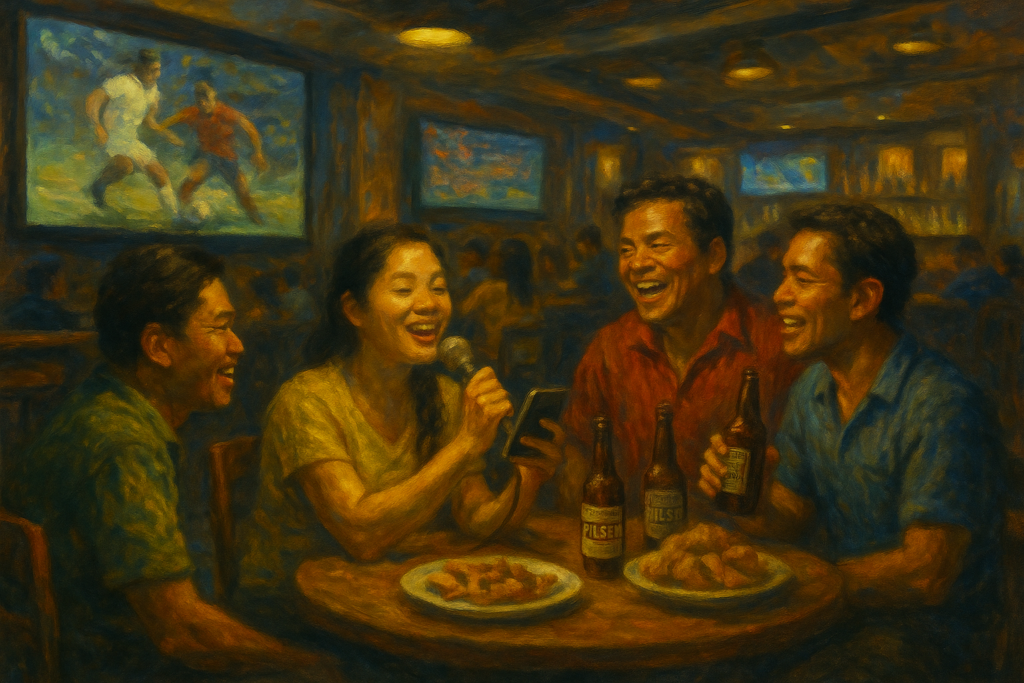
Music moves the world.
It connects people across borders, inspires change, drives industries, and shapes the way we experience life. From films and fashion to video games and everyday products, music touches every sector. Behind every song, performance, and brand is intellectual property (IP) that drives creativity, enables collaboration across industries, and fuels economic growth.
This World Intellectual Property Day on 26 April 2025 celebrates the theme “IP and Music: Feel the Beat of IP”, highlighting how creativity, innovation, and IP rights support a thriving music industry that benefits everyone. At Markport™, we believe musicians, entrepreneurs, and small businesses deserve strong IP protection to turn creativity into lasting value.
Whether you are writing songs, building a brand, or creating new technologies, IP protection ensures that your hard work is respected, rewarded, and ready for new opportunities.
How IP Protection Supports Music and Business Growth
Protecting your intellectual property is a practical step that strengthens your ability to expand, collaborate, and innovate across industries. Here is how different types of IP support musicians and creative businesses:
Copyright Protection
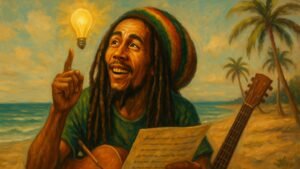
Copyright automatically protects your original works the moment they are created and recorded. This includes song lyrics, musical compositions, album artwork, performances, film scores, and theatre plays. Copyright ensures you retain control over how your creative works are used and shared.
- Music and Lyrics 🎵
When you write a song, both the melody and lyrics are protected by copyright from the moment they are recorded or written down.
Example: Bob Marley’s family has successfully protected his music, keeping his legacy strong decades after his passing. - Film Scores 🎬🎶
Composers for films hold copyright in their original scores, ensuring they are credited and paid when their music is used.
Example: Hans Zimmer’s scores for major films like Inception and The Lion King are protected and licensed across media platforms. - Theatre Plays and Musicals 🎭🎶
Playwrights and composers retain copyright over the scripts, music, and lyrics of theatre productions and musicals.
Example: Lin-Manuel Miranda’s Hamilton is protected by copyright, covering both the script and musical compositions, enabling controlled performances and adaptations worldwide.
Copyright gives creators exclusive rights to reproduce, adapt, perform, and license their works, providing ongoing opportunities to earn income and preserve their artistic vision.
Trademark Protection
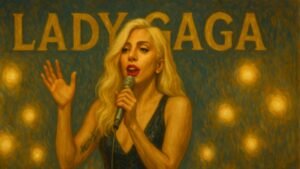
Trademarks safeguard your brand identity, including your artist or band name, logos, album titles, taglines, and even costumes. A strong trademark builds recognition and prevents others from using your brand without permission.
- Band Names 🎸
The Rolling Stones registered their name and the iconic tongue-and-lips logo, protecting their brand across merchandise, concerts, recordings, and endorsements. - Solo Artist Names 🎤
Bruno Mars secured trademark protection for his stage name, covering live performances, recorded music, clothing, and related merchandise. - Group Names and Branding 🎶
Blackpink registered their group name and logo to protect their brand internationally, supporting a global business in music, fashion, endorsements, and merchandising.
Trademark registration allows artists and bands to expand their reach, build partnerships, and prevent unauthorised use of their names and images.
Patent Protection
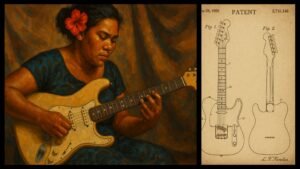
Patents protect technological innovations and inventions in the music industry. Examples include:
- Electrified Musical Instruments 🎸⚡
Patents protected early innovations in electric guitars, such as how pickups capture and amplify string vibrations. - Music Playback Devices 📱🎶
Apple secured patents for innovations in digital music players, including the iPod’s scroll wheel and navigation interface. - Audio Compression Algorithms 🎵🖥️
The MP3 format was protected by patents covering how digital audio files are compressed and decompressed for storage and streaming. - Auto-Tune Technology 🎤🎶
Auto-Tune software was patented for its real-time pitch-correction algorithm used in studio recordings and live performances. - Electronic Music Production Tools 🎛️🔊
The Moog synthesiser was patented for its method of generating electronic sounds, changing modern music production. - Streaming Technologies 🌐🎵
Streaming services secured patents for technologies that manage the compression, storage, recommendation, and delivery of music online.
Design Protection
Designs protect the unique visual appearance of products, such as shape, pattern, or ornamentation, rather than function. In the music and technology industries, designs play a critical role:
- Gibson Guitar Body Designs 🎸
Gibson protected the iconic Les Paul and Flying V guitar shapes, helping them stand out visually in the market. - Beats by Dre Headphones 🎧
Beats Electronics protected the sleek shape and logo placement of their headphones through design registration.
Design protection adds commercial value by helping products become instantly recognisable.
Protecting Traditional Knowledge and Cultural Expressions
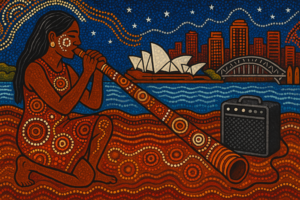
Traditional knowledge (TK) and traditional cultural expressions (TCEs) are an essential part of the music industry. They include songs, dances, musical styles, and cultural practices passed down through generations, often belonging collectively to Indigenous peoples and local communities.
Protecting TK and TCEs helps ensure that cultural heritage is respected, acknowledged, and fairly used in contemporary music projects and commercial activities.
Examples include:
- Didgeridoo Music from Aboriginal Australian Communities 🎵🌏
The didgeridoo is a traditional wind instrument from Indigenous Australian cultures, with unique playing styles and rhythms that are part of sacred traditions. Respecting its cultural significance includes acknowledging its origins and ensuring that it is not commercially exploited without proper consent. - Haka Chants from Māori Culture in New Zealand 🎶🏉
The haka is a traditional chant and dance of the Māori people, often performed at major sporting events. Some haka compositions are protected as cultural expressions, and permission is required for their commercial use or reproduction.
Musicians, producers, and businesses working with traditional music and cultural elements should seek appropriate permissions, respect cultural protocols, and support fair recognition of the communities involved.
Digital Protection

Managing intellectual property in the digital space is essential for any musician or creative business. Online platforms such as YouTube, Spotify, Apple Music, and TikTok have developed systems to help artists identify, track, and control the use of their music across the internet.
These tools include Content ID systems, automated copyright reporting, and rights management dashboards that allow artists and rights holders to monetise, monitor, or remove unauthorised use of their music in videos, livestreams, and other user-generated content.
YouTube’s Content ID allows registered rights holders to upload reference files of their songs. The system scans all uploaded videos and automatically detects any matches. Rights holders can then choose whether to monetise, track, or request removal of those videos.
Spotify for Artists and similar platforms provide insights into how music is being streamed, who the listeners are, and where plays are coming from. This helps artists track performance and identify possible misuse across digital channels.
Example: Billie Eilish’s team uses YouTube’s Content ID system to protect her music from unauthorised uploads. When her songs are detected in user-generated content, her team can choose to monetise the videos or request their removal, ensuring that her work remains properly credited and commercially protected.
For today’s musicians, digital IP protection is essential. It ensures that their work is used fairly, credited properly, and commercially protected across platforms where their music is discovered and shared.
Contracts and Licensing

In the music industry, contracts are treated as the law between the parties. They set out the agreed terms clearly, ensuring that each person involved understands their rights, responsibilities, and financial entitlements. Without a written contract, misunderstandings can easily arise about who owns a song, how royalties are shared, or what each party is expected to deliver.
Clear contracts define important matters such as ownership rights, revenue splits, licensing permissions, performance obligations, and dispute resolution processes. They provide certainty and protect all parties if disagreements occur in the future.
Licensing is one of the most powerful ways for musicians to generate additional income. By licensing music for use in films, television shows, commercials, and video games, artists can extend the reach of their work, build brand recognition, and earn revenue beyond traditional album sales and live performances.
Example: Nirvana’s song Something in the Way was licensed for the 2022 film The Batman, introducing the band’s music to a new generation of listeners. The song’s haunting presence in the film not only created a strong emotional impact but also led to a significant surge in streaming numbers and renewed commercial success for the band.
For musicians, having strong contracts and strategic licensing agreements is critical to unlocking long-term value from their creative work
Global Protection
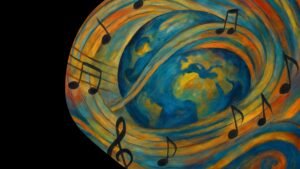
In today’s global music and entertainment market, protecting intellectual property internationally is essential. Copyright protection benefits from international agreements such as the Berne Convention for the Protection of Literary and Artistic Works, which ensures that once your music is protected in your home country, it is automatically protected in over 180 other member countries. This means that musicians do not need to register separately for copyright protection in every country where their work may be used or performed.
However, protecting your brand identity, such as your name, logo, or merchandise designs, requires a different approach. Trademark rights are territorial, meaning that registration in one country does not extend protection automatically to others. To secure exclusive rights to your brand in different countries, you must file separate trademark applications in each market where you plan to sell music, merchandise, or perform.
International systems, such as the Madrid Protocol, can make the trademark registration process more efficient by allowing you to file one application and designate multiple countries. Even so, every market has its own legal requirements, fees, and procedures, and local advice is often necessary to ensure successful registration.
For musicians expanding into overseas markets, registering trademarks early helps avoid disputes, protect merchandising opportunities, and strengthen brand recognition internationally.
What Markport™ Can Do for You
At Markport™, we help musicians, entrepreneurs, and small businesses protect their intellectual property through:
- Trademark registration for artist names, logos, album titles, and merchandise branding
- Copyright advice and management to safeguard original music, performances, film scores, theatre works, and cultural expressions
- Design registration to protect the unique visual features of products and merchandise
- Trademark design services to build strong, recognisable brands ready for expansion
- Ongoing IP support to help manage and grow your intellectual property assets over time
Protecting your brand and creativity today ensures you can collaborate across sectors, expand into new markets, and reach new audiences with confidence.
At Markport™, we believe musicians, entrepreneurs, and small businesses deserve strong IP protection to turn their creativity into lasting value. We proudly support the creative industries, including musicians, because those who create are the ones who truly live.
Let us help you protect your music, brand, and creative future.
Contact Markport™ today:
🔗 https://markport.com.au/contact-us/
#WorldIPDay #MusicAndIP #MusiciansRights #TrademarkProtection #DesignProtection #CopyrightProtection #TraditionalKnowledge #CulturalExpressions #IntellectualProperty #Markport #FeelTheBeatofIP
